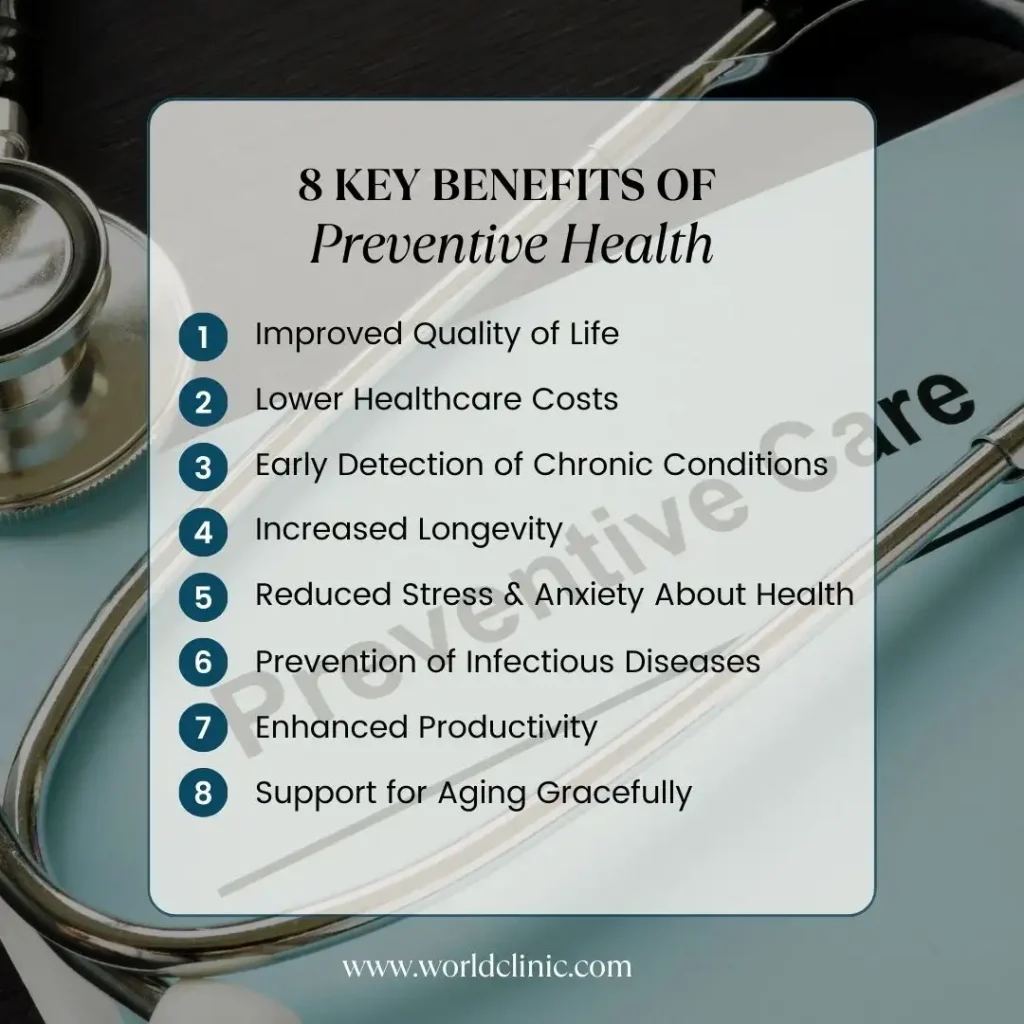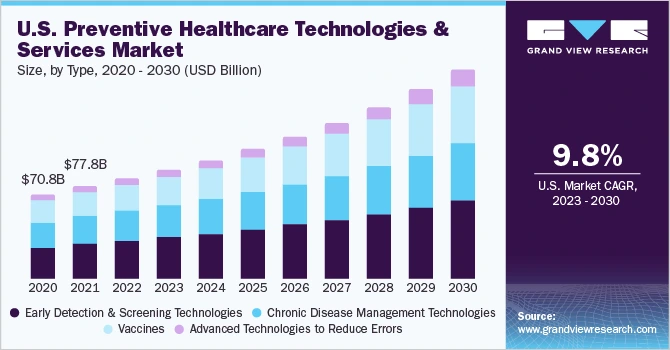70% of deaths in the US are caused by chronic diseases that could’ve potentially been prevented. From heart disease and cancer to diabetes and other conditions, the benefits of preventive health may be the key to diagnosing and treating life-threatening illnesses.
Under the ACA (Affordable Care Act), employers with more than 50 full-time employees or full-time equivalents (FTEs) are required to offer health benefits to their employees. As an employer, if you have to invest in the health of your employees, you might as well do it right.
By offering your employees preventive health benefits like routine screenings and wellness checkups, you can help them with early detection and empower them to enjoy longer, healthier lives with reduced risks of falling ill.
Preventive healthcare models have proven to lower overall healthcare costs and utilization. Aside from keeping them happy, healthy, and productive, preventive medicine can ultimately save lives.
In this guide, we’ll tell you all about the benefits of preventive health and how you can maximize them as an employer or patient. Without further ado, let’s get started.
What Is Preventive Health?
Preventive health is a model of healthcare that focuses on proactive measures that help detect, treat, or entirely avoid health problems before they turn into complex issues. These models are usually combined with membership medicine plans like concierge medicine.
The main medical services that preventative healthcare includes are:
- Routine screenings for monitoring vital signs and assessing the general health of a patient to detect potential issues early.
- Vaccinations and immunizations for preventable diseases like the flu, pneumonia, measles, etc.
- Health risk assessments to understand the patient’s current health status and potential health risks based on family history and lifestyle.
- Lifestyle interventions relating to diet, exercise, stress, and sleep management.
So, why is prevention important in healthcare? It helps with long-term health management instead of simply treating symptoms as they come up, leaving underlying issues untreated. On top of all this, you can save money on medical expenses and stay healthier throughout your lifetime.
8 Key Benefits of Preventive Health
The benefits of preventive health are too many to count on one hand, but we’ve narrowed them down to 8. Ultimately, if you’re looking to avoid costly medical procedures, detect chronic conditions early, and improve the overall quality of your life, prioritizing prevention over treatment can do the trick.

What are the benefits of preventive health care? Let’s dive in and understand.
1. Improved Quality of Life
First things first, let’s talk about the improved quality of life you can get as one of the main preventive care benefits. Regular checkups are the key to detecting and treating or even preventing debilitating conditions.
All of this will not only put your mind at ease about your health, but it will also allow you to stay active and enjoy a fulfilling life.
2. Lower Healthcare Costs
Saving on medical expenses is another amazing benefit of preventive health. If you address a potentially complex issue early on, you’ll avoid expensive treatments and hospitalizations in the future.
Over the long term, proactive care has a positive ROI for employers. As for individuals, they don’t have to deal with out-of-pocket expenses in the case of a sudden health issue flare-up.
3. Early Detection of Chronic Conditions
This is probably one of the more direct benefits of preventive health. Without routine screenings, people usually find out about hidden chronic conditions they’ve had way too late.
Preventive health models usually include annual screenings to check for diseases like diabetes, heart disease, cancer, and more. Catching such issues earlier can not only improve treatment success rate and prognosis but also potentially save your life.
4. Increased Longevity
If you never take your car to the mechanic for routine maintenance, you shouldn’t be surprised if it suddenly stops running one day. You can change your car, but you can’t change your health.
With preventive health measures, you’ll live a healthier lifestyle, lower your risks of unexpected health problems, and live a longer, healthier life as a whole.
5. Reduced Stress and Anxiety About Health
This benefit of preventive health isn’t medical – it’s mental. Knowing that you are healthy can give you the peace of mind you need to live a better life.
Thanks to regular health assessments, you can identify if you’re at risk of specific diseases and find solutions to them as you go. If you have anxiety about your health, you’ll find this benefit especially attractive.
6. Prevention of Infectious Diseases
Vaccinations and immunizations are a huge part of the preventive healthcare model. They can protect individuals and even communities from sicknesses like the flu, common cold complications, strep throat, and more.
As an employer, offering preventive health services to your employees will help you be confident about the health of your workforce against infectious diseases.
7. Enhanced Productivity
With a focus on preventing health issues before they turn into serious issues, these healthcare models truly help improve the productivity of your employees.
Healthier workers take fewer sick days and perform better as a whole, benefiting workplaces and families. You’ll reduce both absenteeism and presenteeism, meaning that your workforce will be more present and productive at the office.
8. Support for Aging Gracefully
The last one of the benefits of preventive health we want to touch upon is the support it has for the whole lifespan of individuals. From children to elders, preventive health measures maintain both their physical and mental wellness.
The support of the program grows along with its patients. Ultimately, it aims to keep patients independent as they age.
The Benefits of Preventive Health Screenings
While we’ve already talked about routine screenings as one of the key advantages of preventive health, let’s dig a bit deeper and understand why and how they work.
The primary goal of preventive health screenings is to catch potential risks and early warning signs, allowing doctors to intervene in a timely manner. At the end of the day, this can prevent serious complications and more.
The key screenings usually included in preventive health programs are:
- Routine checkups
Routine tests are the basic checks or biometric screenings done to understand the general health profile of a patient. This includes your doctor going over your medical history and monitoring your vital signs. If they find anything odd, it’ll be a warning sign to look deeper.
- Tests for heart health
The modern workplace can be a stressful place, especially for C-level executives. Since stress is one of the biggest culprits of heart issues, it’s important to test blood pressure and perform cholesterol screenings. Preventive medicine plays a huge role in avoiding or treating cardiovascular diseases through early detection.
- Cancer screenings
Next up, screenings are done to detect one of the biggest health problems out there – cancer. Depending on the demographics of a patient, they will need to undergo mammograms, colonoscopies, skin cancer checks, and more. These screenings are essential for early detection, improving outcomes and even saving lives.
- Screenings for diabetes
Another chronic condition that can suddenly creep up is diabetes. That’s why preventive care programs include blood sugar tests to identify and manage diabetes as soon as possible.
- Tests on bone density
One vital sign that is important for long-term health is bone density. Testing it can help prevent fractures and osteoporosis, especially for older adults and postmenopausal women.
- Mental health assessments
Finally, preventive health screenings go beyond physical health and cover mental health assessments as well. Just like any other health condition, detecting anxiety and depression early on can foster holistic wellness. Usually, preventive health programs can get patients the doctor referrals they need to stay sharp both physically and mentally.

7 Tips to Maximize the Benefits of Preventive Health
Before we wrap up the topic of preventive care benefits, allow us to give you some practical tips you can use to get the best out of your preventive health programs.
If you’re new to healthcare models like this, remember that it’s crucial to be proactive when it comes to your health. Preventive health programs prioritize this ideology and allow you to take charge of your well-being through regular checkups, early interventions, and tailored healthcare strategies.
One of the best ways to squeeze all the juices out of your investment into preventive health is to couple it up with concierge doctors. Full disclosure – your investment will become more expensive, but your ROI only stands to go up.
Here are our 7 tips for maintaining effective preventive care programs:
- Schedule regular checkups: It is in your hands to keep up with routine health assessments where a potential health issue can be detected. These checkups are foundational to proactive health management and early intervention.
- Keep up with your screenings and vaccinations: Your programs come with a recommended schedule for health assessments and immunizations. If you want to get the most out of your preventive health plan, the best thing you can do is adhere to your doctors’ orders.
- Access 24/7 physician support: As one of the benefits of concierge medicine, you can immediately get in touch with a medical professional over the phone. Take advantage of this feature instead of going to the ER. Remember that with preventive medicine, you have reliable healthcare access anytime, anywhere.
- Build a tailored health plan: Work with your doctors to create a wellness plan that perfectly fits your individual goals, needs, and risks. This way, you can stay focused on your long-term health outcomes.
- Take advantage of stress-management tools: Preventive health programs put a big focus on stress management and encourage techniques like mindfulness, meditation, or staying physically active. As a patient, you stand to improve both your mental and physical health by utilizing these methods and adopting wellness concierge solutions.
- Use coordinated care options: If you have the option to leverage an integrated system for healthcare management, you should use it. Good concierge medicine providers have a huge network of specialists ready for referrals and extensive care coordination services. Listen to your providers and enjoy this comprehensive approach to care.
- Leverage telemedicine for convenience and cost-efficiency: Advanced concierge clinics with preventive health programs use virtual consultations for routine checkups or urgent concerns. You’ll be able to connect to your doctor remotely, anywhere, anytime, so use it to improve both your health and quality of life.
Conclusion
The benefits of preventive health go beyond improved health outcomes. They go deeper and impact your costs, productivity levels, and mental health.
Preventive screenings are a huge part of such programs, and they help with early detection. On top of all that, they reduce risks and keep you and your family or employees healthier over a longer lifespan.
Ready to embrace the benefits of preventive care? Here at WorldClinic, we specialize in health and longevity planning, physician-lead health coaching, and more for employers, executives, as well as individuals who value their health.
Explore our concierge medical services that offer personalized and proactive health solutions tailored to the needs of our patients to find out more. If you’re still unsure, simply start by looking through our membership plans.
FAQs about Preventive Healthcare
1. Why is preventive healthcare beneficial?
There are a multitude of benefits to preventive healthcare, including early detection, timely interventions, and health risk assessments. Thanks to preventive health, severe illnesses become less likely, medical costs go down, and patients become healthier over the long-term.
2. How does concierge medicine enhance the benefits of preventive healthcare?
Concierge medicine and preventive healthcare complement each other on many levels. From personalized care and 24/7 global access to healthcare providers to tailored health plans and telemedicine, this combination gives patients consistent monitoring, early detection, and much more.
3. Who can benefit the most from preventive healthcare?
While preventive care is a model that can accommodate all members of a family, the individuals who will benefit most from it are people with chronic diseases, aging adults, and busy professionals.
4. What role do telemedicine and virtual consultations play in efficient preventive health?
Preventive health can be effective if the patients stay consistent. With telemedicine, healthcare becomes convenient at all times and places. Thanks to remote consultations, ongoing health monitoring, and follow-ups, patients no longer must deal with unnecessary in-person visits. Ultimately, it saves time and makes for consistent medicine for people who live busy or remote lifestyles.
5. How can health screenings benefit the outcomes of preventive healthcare?
Health screenings and diagnostics are the best tools for detecting early warning signs of cancer, diabetes, heart disease, and more. If you identify risks early, your doctors can intervene on time and help you improve health outcomes and recovery rates.


